Below we publish a round up of race and civil liberties issues related to coronavirus in the UK and Europe. See our regular calendar of racism and resistance here.
ASYLUM AND MIGRATION
21 March: A group of migrant justice organisations including the Public Interest Law Centre, Project 17 and Migrants’ Rights Network write an open letter to councils calling on them to establish COVID-19 homeless task forces to support the estimated one million undocumented migrants in the UK who are at risk of destitution as a result of the health crisis. (Migrants Rights, 21 March, Guardian, 23 March 2020)
25 March: The government announces that those in the UK on visas may have their leave to stay extended until the 31 May 2020 if they are unable to return when it expires because of the coronavirus outbreak, but stipulates that extensions will only be granted to those who contact the Home Office to ask for one. (Right to Remain, 25 March 2020)
Reception and detention
12 March: The mayor of Tuzla, Bosnia prohibits the distribution of food and water to displaced people, citing Covid-19. (Are You Syrious, 12 March 2020)
12 March: Médecins sans Frontières (MSF) calls for the immediate evacuation of migrants and asylum seekers from the overcrowded and insanitary Greek island camps, and criticises the government’s failure to put in place an epidemic response plan. In some parts of Moria camp in Lesvos, 1,300 people share one water tap and there is no soap. (AYS, 12 March 2020)
13 March: Detainees at the Lesquin detention centre (CRA) in northern France ‘self-isolate’ by avoiding the refectory, which means effectively going on hunger strike, after staff failed to implement any protective measures for inmates despite a confirmed Covid-19 case at the centre. Visits are forbidden and there are no court hearings so no chance of leaving. (AYS, 14 March 2020)
13 March: The mayor of San Ferdinando in Reggio Calabria, where up to 1,000 migrant farm workers live in tents and containers, calls for increased aid in the area, as NGOs warn that the workers are at high risk and need more tents, rest rooms and disinfectant. (AYS, 13 March 2020)
16 March: Authorities in the Bosnian Una-Sana canton enforce restrictions on its displaced population, saying they will move roughly 2,000 people sleeping rough into camps and those in camps will be forbidden from leaving, while those without papers housed in private homes must leave them, and asylum seekers may not enter or move within the canton. All the measures contradict the UNHCR directive that emergency measures cannot target specific groups of people, and will concentrate more vulnerable people in appalling conditions. (AYS, 16 March 2020)
16 March: The new Serbian government passes an order effectively putting all asylum centres on lockdown, only allowing out asylum seekers and refugees for specified purposes, to prevent ‘uncontrolled movement of persons who may be carriers of viruses’. (AYS, 17 March 2020)
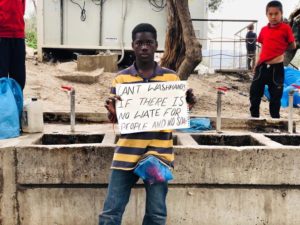
17 March: The Greek migration ministry suspends all visits to migrant camps by individuals and organisations until at least April, and places the camps in lockdown, with schools, libraries and exercise areas all suspended, and new arrivals to be screened and quarantined if found with any symptoms of coronavirus. (AYS, 17 March, Ekathimerini, 17 March 2020)
17 March: The Belgian Federal Immigration Office announces it is closing down its offices and will not review any new or current asylum applications. An asylum housing centre in Brussels also announces its closure. The immigration office admits that, with no measures to protect the welfare of displaced people, the move could push asylum-seekers out onto the streets. (Brussels Times, 17 March 2020)
17 March: Ten detainees at Coquelles go on hunger strike to protest at the lack of information or protection as the centre continues to detain more people despite lockdown measures and despite a Paris court ruling that border closures make deportation difficult and there is a heightened risk of contamination in overcrowded centres. (Calais Migrant Solidarity, 15 March 2020)
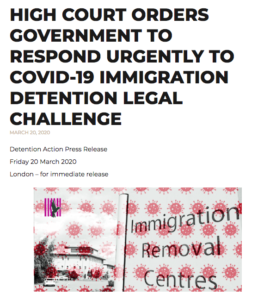
18 March: Detainees in UK immigration centres begin a legal action against the Home Office for keeping in detention vulnerable people with underlying health conditions, when there is no prospect of their deportation owing to travel bans, and the High Court orders the Home Office to file an immediate response to the action. (Independent, 18 March, Detention Action, 20 March 2020)
20 March: As part of a move to allow social distancing, the Belgian government releases 300 undocumented people from detention with an order to leave the country in 30 days, rather than booking them onto a deportation flight. Some of those freed have underlying health conditions such as diabetes or bronchitis. (Brussels Times, 20 March 2020)
21 March: After police in Brussels begin arresting the displaced people camping out in Maximilien Park, near Brussels North station, for violating social distancing measures to stop the spread of Covid-19, the owner of a Brussels hotel offers rooms to 120 of them. (Brussels Times, 19, 21 March 2020)
23 March: As people are trapped in the Moria Camp in Lesvos, Greece, say the government has still provided no information on how to avoid Covid-19, no sanitary facilities and no soap or water, search-and-rescue NGO Sea Watch calls for decommissioned cruise ships to be used to evacuate the refugees from the island camps, while 21 Greek human rights and humanitarian organisations call on the government to move them to safety. (Morning Star, AYS, 23 March; Legal Centre Lesvos, 24 March 2020)
23 March: The displaced population in and around Calais say they have been provided with no support, accommodation, sanitary facilities or protection against the coronavirus despite the ban on movement, sleeping three to a tent and with hundreds sharing a water tap. (Reporterre, AYS, 23 March 2020)
24 March: The government announces that immigration detention centres are closed to visitors ‘to ensure the safe and secure functioning of our centres, while enforcing social distancing’. (Gov.uk, 24 March 2020)
26 March: The High Court rejects a legal challenge brought by Detention Action demanding the release of hundreds of immigration detainees who would be particularly vulnerable to Covid-19, and those from countries to which the Home Office is currently unable to deport people because of the pandemic. This follows news that detainees in at least three detention centres have displayed Covid-19 symptoms. (BBC, 25 March, Guardian, 26 March 2020)
Libya
23 March: The UN refugee agency UNHCR launches an urgent appeal for funds to respond to the Covid-19 pandemic, while at the same time suspending help to refugees in Libya because of Covid-19. (AYS, 23 March 2020)
Borders and internal controls
13 March: The Danish government closes its borders to all non-EU visitors until at least 13 April. The Danish People’s Party demands a total ban on any asylum seekers entering Denmark, and restrictions for existing asylum centres, as a means of ‘limiting the spreading of the virus’. (AYS, 13 March 2020)
16 March: Germany introduces controls at its borders with Austria, Switzerland, Luxembourg, France and Denmark, letting only cross-border workers and delivery drivers through. (The Local, 15 March 2020)
16 March: Italy reduces its immigration offices and services for asylum claims, suspends new applications, renewals and interviews and closes its courts until April. All people rescued at sea will be quarantined for two weeks before they are able to land. (AYS, 16 March 2020)
17 March: European Union member states agree to impose an entry ban to the bloc for all non-EU travellers for the next 30 days. Germany implements the ban immediately, announces it is no longer accepting refugees from any country, and suspends indefinitely its refugee resettlement agreement with Turkey. (The Local, 17 March, Deutsche Welle, 18 March 2020)
18 March: The French government extends all visas, residency cards and asylum applications automatically for three months due to Covid-19. (The Local, 18 March 2020)
20 March: Human Rights Watch confirms that between 1 and 18 March, the Greek authorities have refused the right to seek asylum to a minimum of 625 people, who have instead been detained in the open, in cold temperatures. (AYS, 21 March 2020)
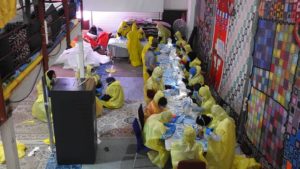
25 March: Over 150 refugee and migrant support groups across Europe sign an open letter to the Greek government, EU and UN officials, following up on their letter of 6 March, protesting at the suspension of asylum rights at the Greek border and the inhuman and deadly conditions for those in the camps. (ECRE, 25 March 2020)
Deportation
18 March: Sweden announces a temporary reduction in deportation flights in the light of Covid-19, as Afghanistan is not accepting any returnees from Sweden. (Are You Syrious, 19 March 2020)
ELECTORAL POLITICS
20 March: Hungary’s government submits a bill to parliament to extend the state of emergency indefinitely, giving prime minister Viktor Orban powers to ‘suspend the application of certain laws, derogate from legal provisions, and take extraordinary measures in the interest if guaranteeing the stabilisation of the lives, health, personal and material security of citizens, as well as the economy.’ (EU Observer, 23 March 2020)
POLICING, CRIMINAL JUSTICE AND PRISONS
16 March: After uprisings in twenty prisons across Italy over the suspension of visits and home leave lead to the deaths of twelve prisoners in Italian prisons since Sunday, nine at Modena – at least seven during riots and one from drugs stolen from the dispensary, the apparent cause of death of three more prisoners at Rieti, near Rome, a decree is adopted enabling the release of 2-3,000 prisoners within the next few weeks. (Prison Insider, 12 March, Liberties EU, 18 March 2020)
17 March: As the first prisoner dies of Covid-19 in Fresnes prison, prisoners across France refuse to return to their cells in protest at the decision to suspend visits in 188 French prisons. Inmates have also had activities such as sport, worship and training suspended. (France TV info, 17, 18 March 2020)
17 March: Prisoners at Nivelles, Belgium refuse to return to their cells in protest at the suspension of visits. (DH Sports/ Prison Insider, 17 March 2020)
18 March: Three prisoners die and two are badly injured when prisoners set fire to mattresses at Satu Mare prison, Romania, in protest at the suspension of visits. (Romania Insider, 18 March 2020)
20 March: The Council of Europe’s Committee Against Torture issues a statement calling on penal authorities to find alternatives to prison wherever possible. (Observatoire International des Prisons, Covid-19 timeline)
23 March: Emergency legislation giving sweeping powers to ban gatherings and forcibly quarantine suspected coronavirus carriers, and allowing local authorities to stop social care for vulnerable and disabled people, passes through the Commons in the UK, despite reservations and civil liberties concerns. It will remain in force for two years, though reviewed every six months. (Guardian, 23 March 2020)
HOUSING
17 March: The Grenfell Inquiry is suspended until further notice, following the escalation of the Covid-19 outbreak. (Inside Housing, 17 March 2020)
18 March: After the Labour party urges the government to introduce a ban on evictions for tenants whose income is affected by coronavirus, the government announces a three-month ban on evictions under emergency legislation announced by housing secretary Robert Jenrick. (Guardian, 16 March, 18 March 2020)
22 March: As NHS paramedic Joseph Hoar describes being evicted from his home because his landlady feared he could spread Covid-19, homeless charity Shelter and a Birmingham NHS Foundation Trust said other NHS staff including nurses had been evicted or threatened with eviction because of similar concerns. (Guardian, 22 March 2020)
DISCRIMINATION
20 March: The Bulgarian government passes a law allowing the military to use force to help curb the movement of people, aimed particularly at Roma, in whose neighbourhoods checkpoints have been erected to prevent people from leaving in large groups. (Al Jazeera, 20 March 2020)
EMPLOYMENT AND EXPLOITATION
 12 March: Hospital cleaners employed by ISS at Lewisham hospital, where the first London coronavirus patient was treated, walk out over the company’s failure to pay them and lack of protective equipment. They are joined by catering and portering staff. The company has threatened to renege on its commitment to pay the London living wage with back pay in April if workers protest. A week later their wages are still unpaid. (Guardian, 14 March, GMB, 19 March 2020)
12 March: Hospital cleaners employed by ISS at Lewisham hospital, where the first London coronavirus patient was treated, walk out over the company’s failure to pay them and lack of protective equipment. They are joined by catering and portering staff. The company has threatened to renege on its commitment to pay the London living wage with back pay in April if workers protest. A week later their wages are still unpaid. (Guardian, 14 March, GMB, 19 March 2020)
20 March: Agricultural labour agencies call for British people to work on farms and in food processing amid growing labour shortages caused by border controls and travel restrictions preventing seasonal workers from coming. (Farmers Weekly, 20 March 2020)
20 March: After Labour presses for action to help the lowest-paid cope with increased work precarity, as pubs, clubs, restaurants, theatres and shops close and workers are sent home, chancellor Rishi Sunak announces that the government will pay 80 percent of wages, to a ceiling of £2,500 per month, to stop employers laying workers off. (Guardian, 16 March, Independent, 21 March 2020)
22 March: As demands grow for self-employed ‘gig economy’ workers to be supported, the Independent Workers of Great Britain (IWGB) union, which has many migrant workers among its members, threatens legal action against the chancellor. (Observer, 21 March, Guardian, 22 March 2020)
24 March: The French government urges the estimated 730,000 French citizens without work or working short-time to ‘rejoin the great French land army’ and work in the fields to replace up to 200,000 migrant agricultural workers prevented from coming by border closures. (EurActiv, 25 March 2020)
25 March: After the government says it ‘has not forgotten’ self-employed workers, the House of Lords debates an amendment to the emergency Coronavirus Bill to provide statutory self-employment pay at the same rate as that offered to employed workers, to protect gig economy workers. (Parliament, 24, 25 March 2020)
25 March: Hundreds of refugee doctors in the UK call on the government and the General Medical Council to fast-track their accreditation so they can help the NHS tackle the Covid-19 pandemic. (Guardian, 25 March 2020)
EDUCATION
23 March: Children identified as vulnerable and therefore entitled to a place in emergency school provision during the coronavirus outbreak have been reported as failing to turn up to school, raising concerns among headteachers about their safety, as those identified as vulnerable have special educational needs or have a social worker. (Guardian, 23 March 2020)
SPORT
21 March: After revelations of food banks running out as donations collapse, Manchester United and Manchester City football clubs donate a combined £100,000 to local food banks, and Celtic FC pledged £150,000 to help community charities and food banks. (Observer, 21 March 2020)
RACIAL VIOLENCE AND HARASSMENT
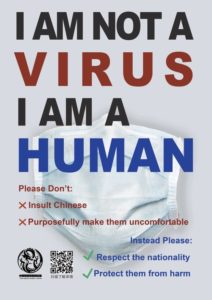
10 March: A shopper is racially abused whilst buying handwash in Leicester, by another customer who used racist slurs and tells him he will ‘die of coronavirus’, following him out of the store and continuing to shout abuse at him. (Leicester Mercury, 11 March 2020)
13 March: Owners of a Chinese takeaway in Runcorn report that a group of ten teenagers have subjected them to coronavirus-related racist attacks since January, throwing stones into the takeaway, hurting staff members and vandalising their car. In February, one family member needed 47 needed stitches after being hit by the attackers. (Runcorn and Widnes World, 18 March 2020)
15 March: Chinese restaurants and takeaways in Cardiff report a downturn in customers and an increase in racism due to the coronavirus pandemic. Restaurant owners report dealing with racist phone calls and verbal abuse. One owner reported that an individual shouted ‘c****s go home’ whilst he was with his family in Caerphilly Castle. (Wales Online, 15 March 2020)
15 March: An NHS nurse releases a video saying ‘people need to wake up and realise that this virus is not an excuse to be racist or discriminate against everyone’, after being racially abused and assaulted as she walked to work for an overtime coronavirus shift the previous day. She was elbowed by a man while a woman shouted ‘at least we are whites you f***ing c***’. (Mirror, 16 March 2020)
17 March: Chinese students at UK universities are returning to China, believing they are safer there than here, because of an increase in racist attacks and concerns about the British government’s handling of the spread of the virus. (Guardian, 17 March 2020)
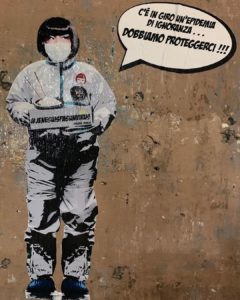
@laika_mcmliv via Instagram
17 March: Police investigate hate mail posted to the owner of a Chinese takeaway in Denmead, Hampshire, calling Chinese people ‘filthy rotten scumbags’ and accusing the restaurant owners of killing and eating ‘our English dogs’. (Independent, 17 March 2020)
21 March: On the International Day for the Elimination of Racial Discrimination, UN Special Rapporteur on Racism Tendayi Achiume calls on states to take action against Covid-19-related expressions of xenophobia, observing that naming a virus with reference to nationality results in ‘racist and xenophobic attacks ranging from hateful slurs … to brutal acts of violence’. (OHCHR, 21 March 2020)
21 March: A couple is attacked and abused by two groups of people while out walking in Edinburgh; first, a group of men threw food and verbally abused them and then, another group in a car shouted ‘corona’. (Edinburgh Live, 21 March 2020)
22 March: Three boys, aged 11, 12 and 13, are arrested by police investigating a racist attack on four Chinese students wearing facemasks in Southampton on 17 March. Two girls aged 14 and 15 were arrested for affray last week for a similar incident, and released on bail. (BBC News, 22 March 2020)
23 March: The Polish ‘Never Again’ Association issues an appeal for solidarity with those suffering racist attacks in connection with the coronavirus, after documenting violence and abuse in Poland, France, Germany, Italy, Belgium and the UK as well as the US, Australia and Canada. (Nigdy Wiecej, 23 March 2020)
The calendar was compiled by the IRR News team with the help of Aisha Rana-Deshmukh, Laura Wormington and Graeme Atkinson.

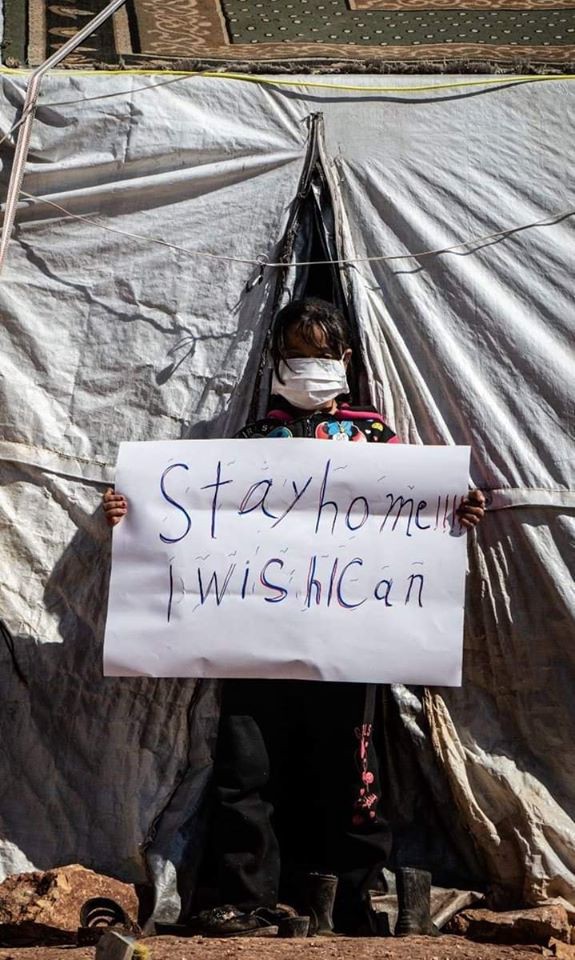
I’m impressed, I must say. Rarely do I come across a blog that’s both
equally educative and amusing, and let me tell you, you’ve hit
the nail on the head. The issue is an issue that not enough
people are speaking intelligently about. Now i’m very happy that I came across this during my search for something relating to this.